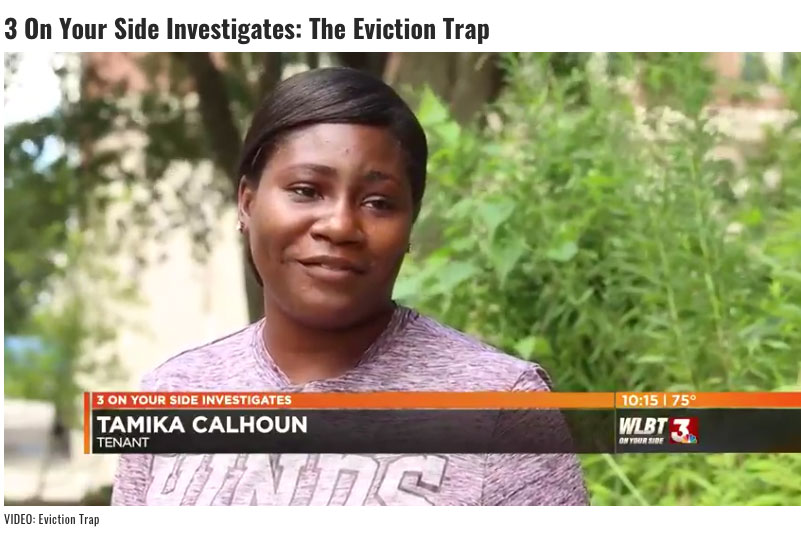Woodward and Bernstein and the Boston Globe Spotlight team may have movies made about them, but most investigative reporters are used to working alone — it comes with the beat. CJ LeMaster is no exception. So the chief investigative reporter at WLBT, Raycom’s NBC affiliate in Jackson Mississippi, admits he didn’t know what to expect when his news director informed him that he was getting a partner.
Her name: Erica Hensley. Hensley is an accomplished reporter with two degrees and a strong track record in data journalism, But Hensley showed up at WLBT with a lot more than her reporting credentials: her work is completely paid for, part of an innovative funding model for investigative journalism. “I would have been crazy to say no to that,” says LeMaster. “I was completely surprised and thrilled,” says WLBT Assistant News Director Charley Jones. “It was a gift.”
It actually was a gift. Hensley works for Mississippi Today, a nonprofit statewide news organization, but her project with WLBT is funded by the John S. and James L. Knight Foundation as an experiment to see what happens when a print reporter and a TV reporter join forces. The goal: four collaborative investigations by the nonprofit and the station over 18 months.
For Mississippi Today, working with WLBT was an opportunity to learn more about video storytelling, says Editor-in-Chief Ryan Nave. “We don’t have the capacity to do it well, and that’s what they do for a living,“ says Nave. “At the end of this, we may learn that compelling video storytelling should not just be a nice add-on to what we’re doing.”
Investigative collaborations are the new black. No fewer than four duPont Awards just went to “investigative news partnerships, including one to TEGNA’s WTSP and the Tampa Bay Times. ProPublica just announced the second year of its Local Reporting Network, which supports local and regional investigative reporting, with new projects in 14 newsrooms around the country. And we recently reported on ProPublica’s partnership with Raycom’s OTT channel InvestigateTV, also supported by Knight.
Back in Jackson, Hensley proposed an idea to LeMaster and his newsroom bosses.
For their first joint project: an investigation into Mississippi’s high rate of evictions and eviction judgments and how that traps Mississippians in a vicious cycle of poverty. Hensley — a “data miner warrior,” in Charley Jones’s admiring words — had found a rich nationwide database of statistics at the Eviction Lab, based at Princeton University, and was ready to dive in. “I was very excited,” says Henley.
That was last spring. In September, WLBT broadcast LeMaster’s 10:27 story on “The Eviction Trap,” and Hensley published “Eviction Note: How a housing program to help families out of poverty may trap some in it” — the first of several related stories — the same day.

For the most part, LeMaster and Hensley divvied up their duties according to their strengths — Hensley mining the data, LeMaster working his contacts at the State House and molding a potentially dry investigation into a television story. “Traditionally, no one in print wants to be tethered to video, and no one in video wants to be tethered to print,” says Hensley.
But the two reporters broke out of their comfortable silos to do some joint interviews and reporting trips. Both say they learned from one another. “We were able to use our respective talents to improve each other’s work,” says LeMaster. “We were doing so much to help one another at the end.”
Typical of an innovative experiment, there were glitches along the way. The complex, data-driven project took longer than it should have to come together, says Charley Jones, and there was a scramble at the end to humanize the material with the relatable “people stories” that television does best. That was a lesson for Mississippi Today’s Ryan Nave. “We think about the anecdotal lead, but it’s easy to forget about the compelling human angle in a very data-driven story.”
But here’s the key takeaway: both partners say the ambitious investigation would never have happened without the collaboration.”Our station could not do this level of investigative reporting alone,” says Jones. “Mississippi Today wants to focus on stories that wouldn’t exist if we didn’t exist,” says Ryan Nave. “This is a story that wouldn’t have been told if not for us.”
LeMaster and Hensley are getting ready to embark on their next investigation, the topic still under wraps, confident that teaming up will be easier the second time around. “By the
(Disclosures: the Knight Foundation also underwrites the Knight-Cronkite News Lab, and Mississippi Today was founded by Andrew Lack, moonlighting from his day job as Chairman of NBC News and MSNBC — a former colleague of mine at CBS News and still a friend.)
Do you have interesting collaborations to share? Let us know at cronkitenewslab@asu.edu.
Related:
Article: InvestigateTV’s bet: If you build it, they will come. Read here.